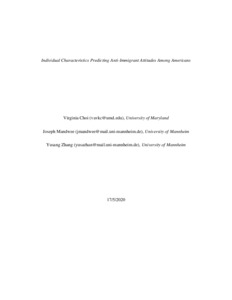|
Individual characteristics predicting anti-immigrant attitudes among Americans
Choi, Virginia
;
Mandwee, Joseph
;
Zhang, Yusang
![[img]](https://madoc.bib.uni-mannheim.de/57366/1.hassmallThumbnailVersion/MADOC%20Research%20Paper.pdf)  Vorschau |
|
PDF
MADOC Research Paper.pdf
- Veröffentlichte Version
Download (241kB)
|
|
URL:
|
https://madoc.bib.uni-mannheim.de/57366
|
|
URN:
|
urn:nbn:de:bsz:180-madoc-573668
|
|
Dokumenttyp:
|
Arbeitspapier
|
|
Erscheinungsjahr:
|
2020
|
|
Ort der Veröffentlichung:
|
Mannheim [u.a.]
|
|
Sprache der Veröffentlichung:
|
Englisch
|
|
Einrichtung:
|
Fakultät für Sozialwissenschaften > Klinische u. Biologische Psychologie u. Psychotherapie (Alpers 2010-)
|
|
Lizenz:
|
 Creative Commons Namensnennung 4.0 International (CC BY 4.0)
Creative Commons Namensnennung 4.0 International (CC BY 4.0)
|
|
Fachgebiet:
|
300 Sozialwissenschaften, Soziologie, Anthropologie
|
|
Freie Schlagwörter (Englisch):
|
Anti-immigrant Attitudes ; Xenophobia ; Prejudice ; Racism ; Discrimination ; Social Dominance Orientation ; Authoritarianism ; Individual Characteristics
|
|
Abstract:
|
Although social scientists do have a somewhat concrete understanding of prejudice and discrimination towards outsiders living within western societies, there is a much weaker and less developed body of literature examining what characteristics are associated with individuals who hold anti-immigrant or xenophobic attitudes, and very few pieces of research have attempted to assess personal, individual characteristics (i.e., values, beliefs, socioeconomic status, etc.…) that impact these attitudes. Nevertheless, there are some studies that point to Social Dominance Orientation (SDO) and authoritarianism in addressing anti-immigrant sentiments. Other research points to socioeconomic factors and political leanings as the influencers of these views. These findings are briefly summarized in the literature review below. The following study then attempts to provide further insights into personal characteristics that predict anti-immigrant attitudes among individuals in the United States, a western nation that is often noted by social scientists for its exceptional and historical openness to immigration and integration. To do so, this research will utilize information from the General Social Survey, which contains tens of thousands of points of data and hundreds of individual variables. We will run the gathered data through a machine learning model to find individual characteristics that meet our criteria in determining which ones play a role in predicting anti-immigrant attitudes. Lastly, we will convey our findings in the graphics and results section that follow and conclude with a brief discussion, limitations to our findings, and recommendations for further research.
|
 | Dieser Eintrag ist Teil der Universitätsbibliographie. |
 | Das Dokument wird vom Publikationsserver der Universitätsbibliothek Mannheim bereitgestellt. |
 Suche Autoren in Suche Autoren in
Sie haben einen Fehler gefunden? Teilen Sie uns Ihren Korrekturwunsch bitte hier mit: E-Mail
Actions (login required)
 |
Eintrag anzeigen |
|
|



 Creative Commons Namensnennung 4.0 International (CC BY 4.0)
Creative Commons Namensnennung 4.0 International (CC BY 4.0)
 Suche Autoren in
Suche Autoren in